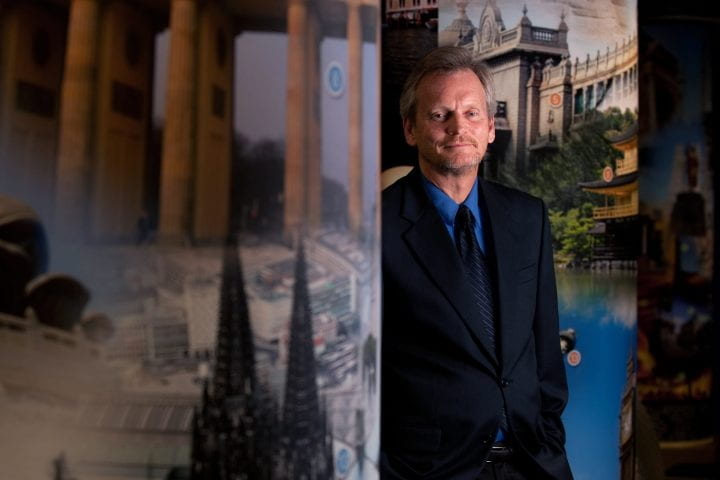Conflicts of interest
Urban planning professor studies cities polarized by ethnic, political and religious differences.

Why can’t people get along? It’s a simple question with very complex answers. And it’s at the forefront of Scott Bollens’ research. The UC Irvine professor of planning, policy & design explores how ethnic, political and religious conflicts play out at the community level in reference to distribution of urban services, housing, amenities and economic opportunity.
Bollens, a former minor-league baseball player turned urban planning scholar, has – over 17 years – interviewed hundreds of community representatives, academics, planners, architects and political leaders in Jerusalem; Beirut; Johannesburg; Belfast, Northern Ireland; Nicosia, Cyprus; Sarajevo and Mostar in Bosnia-Herzegovina; and Bilbao and Barcelona in Spain.
His insights into living and working in these fragmented cities form the basis of his new book, City & Soul in Divided Societies. He found that city planners and policymakers can play significant roles in either intensifying or mitigating major intergroup conflict. This is most apparent, Bollens says, in cities where one area is well maintained and functioning while another – perhaps housing an ethnic, political or religious minority – is in disrepair and lacks basic services.
“I conducted more than 240 interviews and more than two years of field research in some extraordinary places,” he says. “All nine cities that I have studied are conflict-ridden, hurt-filled and often emotionally transcendent. Much like chain-smoking cigarettes, these places exude dangerous and addictive excitement.”
Here, Bollens – who holds the Drew, Chace & Erin Warmington Chair in Peace & International Cooperation – discusses his research, travels and writing.
Q. What is the connection between your interest in urban planning and your research on nationalistic and ethnic conflict?
A. I study polarized cities. Ethnic allegiances and nationalism create pressure for group rights, autonomy or even territorial separation. This is beyond the socioeconomic divisions we see in America. In polarized cities, there is severe splintering of public authority, and violence – both threatened and actual – is often a part of everyday life. I find the link between cities and broader nationalistic conflict a fascinating and understudied one. The topic is at the nexus of urban studies and political science, with geography, social psychology and sociology part of the analytical mix. My working hypothesis has been that amid deep nationalistic conflict, cities matter and can either worsen or improve relations between antagonistic groups. The same proximity that can ignite tension can, if better managed, lead to local examples of cooperation between members of groups otherwise in major political disagreement. Urban policies influence land control, economic distribution, policymaking access and group identity, and each of these affects the degree of ethnic conflict or stability.
Q. Your writing is a lot more personal and intimate than one would expect from an academic. Why did you take this approach?
A. I wanted to write a book that appealed not only to academics but also to a wider public audience. Revealing who you are genuinely is an important part in connecting with others and trying to overcome deeply embedded ethnic/ racial conflict and animosity. I follow this rule as author of this book in revealing who I am as a fully embodied individual – my background, personal struggles, biases, fallibility, humanness – conducting research instead of pretending I am some distanced social scientist with a machinelike neutrality. During my interviews in these cities, I frequently felt like less a robotic recorder and more an engaged individual with views and feelings. The way I wrote City & Soul in Divided Societies acknowledges and honors this fact.
Q. You write about losing a bit of your humanity while living in a heavily fortressed home in South Africa. Do you think U.S. cities are becoming more like Johannesburg in terms of gated communities and security concerns (even as crime rates fall)?
A. Yes, definitely. The walls and spaces that divide people in famous polarized cities are present in the backyards of America, but we don’t realize they’re there or we don’t talk about them. There is a basic challenge in multicultural cities that forces policymakers to face their own beliefs and predilections: In an urban situation where there are antagonistic – or potentially antagonistic – ethnic or racial groups, do city builders create opportunities for them to mix and interact or do they accommodate and reinforce the development of ethnically pure neighborhoods and districts? Decisions such as these will send emotive symbols to future generations about what we either aspire to in hope or accept in resignation. Polarized cities are central to broader debates about urbanism, democracy and cultural diversity precisely because intergroup challenges are so fundamental to their future quality of existence. Lessons from these traumatized places have wide relevance in today’s urban world. The ethnic fracturing of many cities in North America and Western Europe owing to changing demographics, cultural radicalization and migration creates situations of “public interest” fragility and cleavage similar to my case studies. Polarized cities require us to confront whether we are hopeful or pessimistic about our ability to get along together.
Q. Has studying and immersing yourself in these cities and their conflicts changed you as a person? Has it made you more optimistic or dubious?
A. It has changed fundamentally my research methods and my awareness of my humble position in this complex and fascinating world. I am grateful for where I have been and whom I have encountered over these 17 years. I have greater faith in the ability of the human spirit to endure and even thrive but less confidence in the ability of political leaders to lead us in constructive ways.